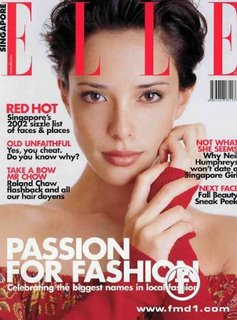According to the South China Morning Post, Information Minister Zainuddin Maidin said models with ‘pan-Asian’ features were not representative of Malaysian demographics.
"Using pan-Asian faces means downgrading local faces," he said. "We have to give priority to models with local looks."
Here’s an excerpt from the article:
The announcement on Sunday extended the ban to advertising carried by private television stations, the print media and billboards.
The minister said the ban would eventually cover all media, but it was unclear when it would take effect.
The ministry would have the power to decide on whether a model's features were appropriate, and be backed up by the weight of law.
A similar ban was imposed in 1997, but the law was later shelved amid an outcry. Now, the government is again under pressure from cultural and religious purists who want to promote "local faces" in the media.
The Association of Accredited Advertising Agents Malaysia said rigid guidelines were already "killing creativity" in the industry.
Australians Rebecca Tan (1st pic) and Sarah Tan ( 2nd pic) – they’re not related – are two of the most high profile faces in the local modelling business. You may not be familiar with their names but you’d definitely recognise their faces. Not to mention MTV darling Denise Keller (3rd pic).
So aside from the Chinese faces we see, and I’m generalising here, possibly the next largest groups would be the pan-Asians and Caucasians.
From an advertiser’s point of view, let’s do an informal poll, what’s right or wrong about preferring models of mixed parentage? Does race affect actual sales figures?
Personally, I feel such images in the media have gotten so commonplace that I don’t question them anymore, but is there even a need to question?



1 comment:
a ban on faces - put that way - sounds silly, but the issues behind it aren't quite so stupid.
mass media is the "gateway drug" to culture, and in our media-addicted societies, there is no longer a line between the two.
while we (and even i) see the ban as borderline stupidity, controlling what we see in the mass media is one step towards reversing a cultural imperialism that has plagued local cultures across the globe for many long years.
we often hear our local politicians talk about "stayers" and "quitters", about our lack of national identity. how many singaporeans, from an early age, entertain thoughts of migrating from our shores? how many make emigration a goal or a benchmark of success?
i know i did, and i know i'm not alone.
do you think the images we see on our magazines and on our television screens might have a direct relationship with emigration and the absence of a truly singaporean culture?
i do.
for a small nation with a very short history, there is little to help us identify with our kinsmen, little to hold us here in this "small town".
it's a problem. it's a cultural problem that has social and economic consequences.
malaysia realises this too.
despite their longer history and stronger sense of nationalism, they too can feel globalism and cultural imperialism take its toll.
unlike singapore, they are less dependant on maintaining good will with the first world. they do not have their hands tied when it comes to taking drastic steps in reversing cultural imperialism.
the first world is slowly beginning to correct their social problems through mass media - from the "real beauty" girls on bottles of Dove, to an looming widespread ban on too-skinny models.
we don't look at those things and say, "boy, that's stupid". it's a good cause. it's fighting anorexia and bulimia. it's making people feel comfortable about who they are. how can that be wrong?
but we see a Denise Keller replaced by some less attractive bumiputra and we cry foul?
on that note, how much is the ideal of "attractiveness" socialised into us by the mass media? if the Dove girls are to be believed... a LOT!
so is there a need to question what we consume from the mass media?
i'm going to have to say "yes".
Post a Comment